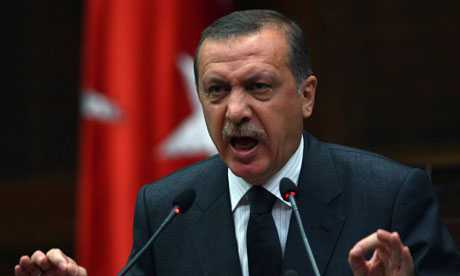Turkey to press ahead with sanctions against Syria

Despite Europe’s failure at UN, Ankara expected to go it alone in imposing sanctions on Assad regime over crackdown on protesters
Turkey’s prime minister Recep Erdogan is expected to announce sanctions against the Syrian regime. Photograph: AP
Turkey is pressing ahead with plans to impose its own sanctions on Syria, despite European powers backing down from using the UN to punish the regime for its crackdown on the protest movement.
The Turkish measures are likely to be announced early next month, following a visit prime minister Recap Erdogan to camps in southern Turkey holding refugees who fled violence across the border and fear reprisals by security forces if they return.
Four European heavyweights – France, Britain, Germany and Portugal – were forced to abandon a recent attempt to use the UN security council to impose sanctions on Syria, following opposition from Russia, China and South Africa.
The four are now working on a watered-down resolution to threaten sanctions if the regime, led by President Bashar al-Assad, does not change its approach.
In the absence of UN security council action, Turkey’s move could be decisive in a six-month standoff between Syrian security forces and anti-government activists which has seen more than 2,700 civilian deaths and sharply destablised the region.
Erdogan is preparing for a range of economic, military and political sanctions which will further damage the once-close relationship between the two states.
After playing a backseat role during the first months of uprising in Syria, Turkey has taken centre stage. Some observers believe Turkey is potentially the most influencial regional player to emerge in the crisis.
“The reassessment on the Turkish side was because the formal policy of ‘zero problem with the neighbours’ was coming to an end as a result of the Arab Spring,” said Sinan Ulgen, a visiting scholar at international diplomacy organisation Carnegie Europe. “Turkey was somewhat late in making that evaluation, on Libya for example.
“Turkish policy makers realised that [the policy] could no longer stand because it boiled down to ‘zero problem’ with the regimes. The government could no longer showcase Syria as a shining example of political success. From that point the policymakers took a decision to be on the right side of history and be much more supportive of the pro-democracy movements in these countries.”
As the Syrian uprising gathered pace in March, Erdogan and his government were reluctant to criticise the actions of the regime’s security forces. Turkey’s foreign minister twice met with Assad and Erdogan spoke with the Syrian leader several times by phone.
“He believed that he had Assad’s word,” said a source close to the Turkish leader. “Then it became clear that everything he said he was not honouring.””There was built up frustration in Ankara at the stubbornness of the regime in Damascus,” Ulgen said. “The Government believed that they had established such a strong relationship with Assad, that they would be able to nudge the government in a certain direction.”
The dramatic deterioration in relations between Assad and Erdogan has led to speculation that Syria may use the Kurdish minority in the north of the country to agitate Ankara. The PKK, a Kurdish group regarded by Ankara as a terrorist organisation, has strong support among the Kurds of Syria. The Turkish military fears Syrian officials may try to spark conflict.
“It has happened once before 10 years ago,” said a Turkish official. “We will watch closely to see what they do this time.”
Ulgen added: “There is speculation that … the PKK card [will] be played against Turkey,” said Ulgen.
There is also speculation that Turkey may establish a buffer zone inside its border, or inside Syria if fighting in northern areas continues. But Ulgen downplayed such talk. “It is politically very unlikely as things stand,” he said. “The only scenario for this to become possible is if there is a resurgence in the atrocities that lead to a big refugee movement again.”
Turkey continues to host senior members of Syria’s nascent opposition movement and defectors from the military. It is understood to be working with the United States on moves to improve organisation of the oppsotion, but insists no military support is being provided.”The next month will be very important in all of this,” said the Turkish offiical.
Ulgen agreed. “The deficit of trust is so big … things can never return.”
via Turkey to press ahead with sanctions against Syria | World news | The Guardian.

Leave a Reply